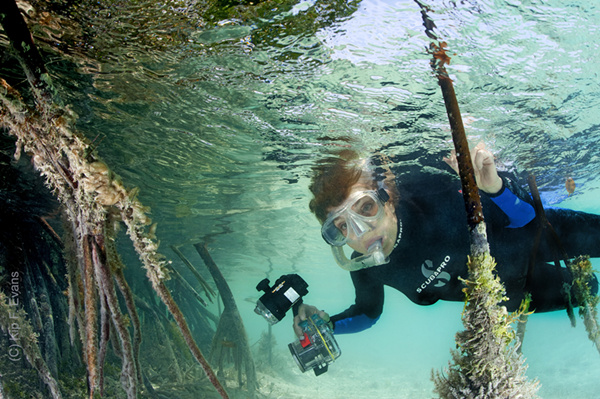 |
|
Sylvia Earle dives in the mangroves.[Photo/China Daily]
|
In the past 60 years, she said, however, human beings have lost-"actually taken and eaten"-more than 90 percent of the big fish in the ocean, including sharks. People are extracting out of the ocean approximately 100 million sharks each year, and China is the biggest consumer of sharks. The demand for shark fin is driving nearly a third of all the world's shark species to the brink of extinction. Another 25 percent are close to becoming threatened.
"Sharks are in crisis," she said. "The ocean is in trouble."
The good news is that 10 percent of the big fish including sharks still remain in the ocean, she said. There's still time, "but not a lot, to turn things around".
But business as usual means that in a few decades, there will be no commercial fishing for sharks, she said, because they will simply be gone. That's why the decision in 2012 by the Chinese government to prohibit the consumption of shark fin and other wildlife products was a great step forward for global shark conservation, she said. "Chinese consumers can play an incredibly important role in saving the world's sharks from extinction," she said.
That's why she came to China to support a major new conservation initiative, Shark Protection in Action, co-launched by Link Capital Nature & Social Affairs Center, a Beijing-based grassroots conservation NGO, and the Pew Charitable Trusts, a US nonprofit organization. The goal is to encourage Chinese businesses and individuals to make a pledge not to eat shark fin soup.
At a fully packed lecture hall in Tsinghua, Earle also had a dialogue with popular Chinese actor Liu Ye, who is an Earth Day Ambassador and an ardent scuba diver. Liu called Earle his "idol and a source of inspiration" and admitted that he would eat shark fin soup before he met his French wife in 2009. With her, he has started scuba diving. "No eating since then," he said.


























 Raymond Zhou:
Raymond Zhou: Pauline D Loh:
Pauline D Loh: Hot Pot
Hot Pot Eco China
Eco China China Dream
China Dream China Face
China Face






